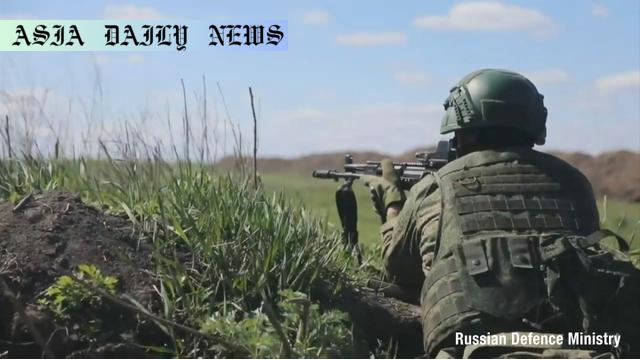North Korean troops face heavy casualties, with 600 deaths and 4,700 total casualties reported during deployment to Kursk, Russia.
- North Korea dispatched 15,000 troops to Russia’s Kursk region.
- Casualties amount to 4,700, including 600 deaths.
- Wounded soldiers are being sent back to Pyongyang for treatment.
- North Korea has exchanged manpower and weapons for Russian military technology.

Introduction
The conflict in Ukraine has seen global involvement in various forms, but the participation of North Korean troops in Russia’s war efforts marks a unique geopolitical development. Recent reports from South Korea’s National Intelligence Service (NIS) reveal the devastating toll this deployment has taken on North Korean forces. With approximately 15,000 troops sent to the Kursk region of Russia, the casualty figures are staggering: 4,700 casualties in total, including 600 deaths. These developments signify the deepening complexity of this conflict and the dire consequences of North Korea’s alliance with Russia.
Heavy Casualties Amid Deployment
The casualty figures reported are alarming. Out of the 4,700 casualties incurred, 600 soldiers have lost their lives. This is a significant loss, highlighting the intensity of the conflict in Kursk and the vulnerability of North Korean forces operating in unfamiliar terrain. Remarkably, about 2,000 wounded soldiers were transported back to Pyongyang via air and rail for treatment between January and March, indicating the severe injuries sustained in combat.
Strategic Partnership Between North Korea and Russia
The deployment of North Korean troops to assist Russia demonstrates a growing partnership between the two nations. In exchange for manpower and weapons supplies, North Korea has reportedly received advanced military technology from Russia, including drones, electronic warfare systems, and anti-aircraft missiles. This exchange has notable implications, both for the strength of North Korea’s military capabilities and for the broader geopolitical dynamics in the region.
Improved Combat Proficiencies
Despite the heavy losses, the NIS has observed advancements in the combat capabilities of North Korean troops. Through their involvement in the Kursk conflict, these units have become proficient in using advanced military equipment, including drones. This operational experience will likely enhance the overall competence of North Korea’s military forces, raising concerns about future regional security challenges.
Impacts of Reduced Fighting
Interestingly, recent months have seen a decline in active combat in Kursk, likely due to intensified Russian efforts to regain control of the region earlier in the year. While this decrease in fighting may temporarily reduce the rate of casualties, it also suggests an ongoing recalibration of strategies on both sides. Nonetheless, the long-term implications for North Korea’s military remain significant, given their newfound reliance on advanced technologies acquired from Russia.
Humanitarian Concerns
Beyond the geopolitics, the human cost of this partnership is troubling. The loss of life, long-term injuries, and the emotional toll on soldiers and their families cannot be overstated. Cremations conducted in Kursk underscore the challenges of repatriating and honoring fallen soldiers. Additionally, the medical burden faced by Pyongyang as soldiers return with severe injuries underscores the hidden costs of such military endeavors.
Broader Geopolitical Implications
The deeper military ties between North Korea and Russia pose significant challenges to the international community. These alliances disrupt global stability and exacerbate tensions, particularly as nations attempt to navigate existing sanctions and maintain diplomatic pressure on both countries. The exchange of military technology, in particular, raises concerns about future arms proliferation in the region, further complicating an already tense geopolitical landscape.
Conclusion
The deployment of North Korean troops to Russia and their subsequent casualties mark a grim chapter in the ongoing Ukraine conflict. While the immediate losses are devastating, the broader implications for regional stability and international relations are equally concerning. The strengthened partnership between North Korea and Russia, facilitated by this deployment, exemplifies the complexities of modern geopolitical alliances and their far-reaching consequences.



Commentary
Alarming Casualty Rates
The report of 4,700 casualties among North Korean troops in Russia shines a stark light on the human toll of geopolitical alliances. These numbers not only highlight the brutality of the ongoing conflict in Ukraine but also raise questions about the motivations behind North Korea’s involvement. Sacrificing the lives of young soldiers for political or military advancements is a reminder of the tragic consequences of such engagements.
Questionable Gains Amid Heavy Losses
While North Korea gains advanced military technologies in return for their support, one must question whether this trade-off is justified. The enhancement of military capabilities could strengthen North Korea’s regional aggression, but at what cost? The lives lost, the physical and emotional injuries sustained, and the overall morale of the military forces are steep prices to pay for any technological upgrade.
A Catalyst for Further Instability
The strengthening alliance between North Korea and Russia poses challenges to global stability. These developments complicate the international community’s ability to address conflicts diplomatically. Moreover, this partnership may embolden other nations to form similar alliances, thereby creating further rifts in an already divided global landscape. This underlines the need for comprehensive international efforts to address such partnerships and their consequences effectively.
Human Costs Overlooked
Lastly, the focus on casualty numbers and political strategies must not detract from the personal human stories buried beneath the statistics. These casualties represent individuals whose lives have been irrevocably changed or ended, leaving families and communities to grapple with the consequences. Humanity must remain at the forefront of any discussion about war and its impacts.
Closing Thoughts
In conclusion, the involvement of North Korean troops in Russia’s conflict against Ukraine highlights the complexities of modern geopolitics. The devastating loss of life and injuries sustained by these soldiers underscore the high cost of military alliances. While nations navigate these difficult dynamics, it is crucial to remember the human lives at stake and work towards peaceful resolutions wherever possible.